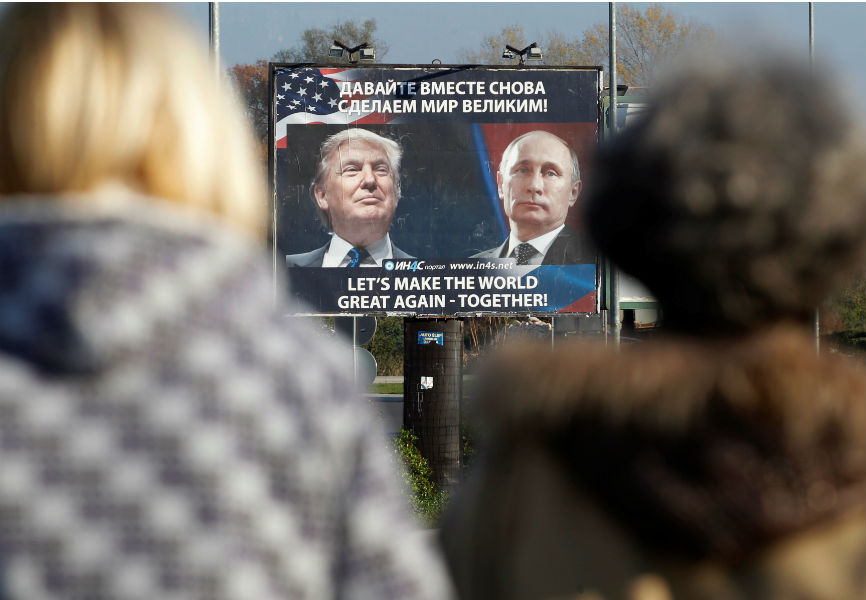New sanctions against Russia going into effect this week are a prelude to a tougher round in three months' time. There seems to be no end in sight to the escalation. Eurasia Group experts Zachary Witlin and Alex Brideau explain the latest measures and some of the dynamics in US-Russian relations.
What are the latest sanctions?
President Donald Trump's administration this week imposed sanctions on individuals and entities for violations connected to North Korea, and for trying to get around cyber sanctions imposed in June. It is also
imposing a series of measures under the Chemical and Biological Weapons Control and Warfare Elimination (CBW) Act of 1991, a law also used against North Korea and Syria, in response to the March poisoning of four people in the UK. Among the first wave of measures, only one is likely to matter much: the presumed denial of US exports of goods and technologies considered sensitive for national security. This could include equipment, such as engines, that could be used for either military or civilian purposes.
The second wave could be more serious. Within three months, the CBW Act requires the US to demand “reliable assurances” from Russia that it is not using chemical weapons, will not use them, and is permitting international inspectors to monitor compliance. If the US is unconvinced, the Trump administration would select from a menu of actions that can be moderate or severe in their impact. At the lower end is downgrading diplomatic relations with Russia, which might involve withdrawing the ambassador. At the upper end is severely restricting trade and crediting between the countries.
Why is the US imposing so many sanctions on Russia?
Sanctions generally are a way for a country to use its economic power to pressure a country's government, typically with the goal of deterring future actions or punishing past behavior. It was the seizure of Crimea and Russian backing for separatists in Ukraine's east in 2014 that
prompted the US and EU to impose the bulk of their sanctions against Russia.
Since then, there's been a downward slide in US-Russian relations, and a more general reliance by the US government on sanctions as a foreign policy globally. Subsequent sanctions have targeted Russian interference in the 2016 election, cyber operations, Syria, and further punishment over Ukraine. When a crisis erupts, or the US wants to oppose Russia on these issues—as in the UK poisoning case—the lack of baseline trust needed for diplomatic solutions makes sanctions the de facto option.
How should we understand the dichotomy between the tough sanctions and Trump's desire for better relations with Russia?
Several groups within the US are driving policy toward Russia. The national security community has consistently taken a hard line against Russia, and in the past Congress has often—but not always—deferred to it to handle policy. But Trump brought his America First foreign policy to the White House, and he has pressed for a stronger relationship with Russia even as his other actions have strained many of the nation's traditional alliances. Congress has occasionally found the president's statements toward Russia alarming—most recently
during the July summit between Trump and Russian President Vladimir Putin in Helsinki—and so has been more willing to impose its own checks on policy toward Russia. The president, for his part, has authorized his government's preferred sanctions measures. But he has also suggested that he holds out hope of reaching a deal with Putin and occasionally questions the views of US intelligence on Russia—especially regarding
Russia's role in the 2016 presidential election.
There has also been an element of domestic politics weighing on US sanctions decisions. Russian interference in the US elections has been the main focus of Special Counsel Robert Mueller's investigation. Republican leaders in Congress have sought to show, through sanctions, that
they take the issue seriously amid Democratic criticism of Trump's friendly rhetoric toward Putin. These political considerations will continue, especially if the Democrats take control of a chamber of Congress in the midterm elections.
Where do US-Russia relations go from here?
Ties aren't going to get much better anytime soon—the disputes are just too strong. The best-case scenario is simply a halt to that slow deterioration. There is no quick fix to rebuilding trust between the two countries. And even if there were more trust and diplomacy, the two countries define their interests in the world in conflicting ways. The worst-case scenario for relations between the US and Russia—the world's two largest nuclear powers—is uncomfortable to imagine. But we are far from reaching that point.

 A billboard showing a picture of US president Donald Trump and Russian President Vladimir Putin is seen through pedestrians in Danilovgrad, Montenegro, November 16, 2016 | REUTERS/Stevo Vasiljevic
A billboard showing a picture of US president Donald Trump and Russian President Vladimir Putin is seen through pedestrians in Danilovgrad, Montenegro, November 16, 2016 | REUTERS/Stevo Vasiljevic